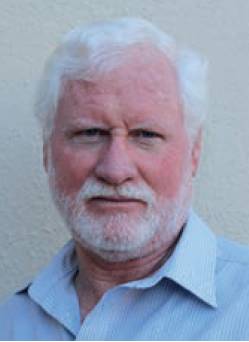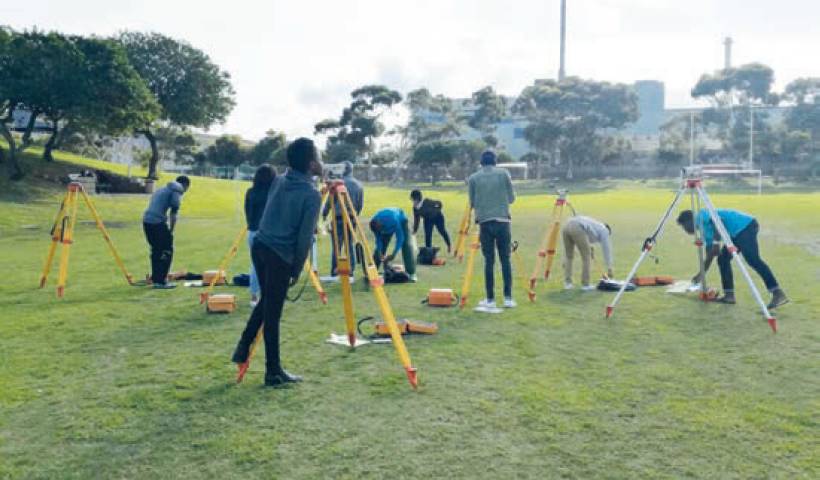The effect of COVID on surveying teaching in South Africa
Hennie Hugo, retired lecturer, Cape Peninsula University of Technology

THE latest tendency in South Africa is to use the term ‘geomatics’ rather than ‘surveying’. However, when one uses these terms with respect to educational purposes, then there is again a distinction between the surveying subjects offered to civil engineering students and that of the courses offered to geomatics students.
Geomatics is viewed as a name used to include both surveying and geographic information science.
For this article, I will focus mostly on the surveying course offered to students who study towards a qualification in civil engineering. The surveying course is a subject offered over the first year of study and includes both theory and a practical components.
First hard lockdown announced
On the evening of 26 March 2020, president Cyril Ramaphosa held the first of what was later on referred to as ‘family meetings’ to announce the first lockdown in an attempt to try and curb the fast spread of the coronavirus (COVID-19 ).
The lockdown began at midnight and would last for 21 days.
The lockdown required all South Africans to stay at home except for essential purposes. This meant that all non-essential activities were suspended.
Since schools, colleges and universities are regarded as non-essential, these were closed with immediate effect.
Since schools, colleges and universities are regarded as non-essential, these were closed with immediate effect. An important fact to take cognisance of is the fact that Cape Peninsula University of Technology (CPUT) students come from all over South Africa.
Quite a number of students come from neighbouring countries such as Botswana, Namibia, Eswatini (formerly Swaziland) Mozambique and Lesotho and also from countries such as the Democratic Republic of the Congo, Uganda and even Mauritius.
For the South African students, CPUT arranged for busses to transport them back to their home towns. However, since air transport became unavailable almost immediately, quite a number of students were left stranded on the campus in Bellville where the engineering faculty is housed. Some students left most of their possessions behind because, like many, they believed that the lockdown and the suspension of classes was only going to be temporary.
To touch on the difficulties that students faced it is worth mentioning that those who were left on campus had to find a way to travel to buy food. In South Africa, most students travels by minibus taxi. Taxis were ground to a halt, trains and busses were not running leaving the students in dire straits.
Moving a contact lectured course online
A huge advantage of teaching practical sessions is that the student is able to see and have the necessary instruments demonstrated by the support staff.
CPUT was always a university where courses were taught on a contact base style. That means that students would attend lectures in lecture rooms, do the practical component of the subjects in laboratories or in the case of surveying outside at the training area. When the lockdown was extended on 9 April 2020 it suddenly became clear that this pandemic was not a temporary setback that would go away anytime within the near future.
CPUT instructed academic staff to convert lecture material (as far as humanly possible) to online teaching – a mammoth task on its own. The software used for this purpose – which has been available for a number of years at CPUT – is Blackboard. However, not all lecturers used or utilised Backboard. I, for one, never used Blackboard when I was lecturing. The instruction from management was to keep the data size of study material as small as possible for the purpose of sending it to students.
Anyone who knows the complexity of the elements of surveying theory would understand that to keep study material, explanations etcetera, in small data files, is just about impossible. Imagine trying to make a video to explain circular curve geometry, or even worse, compound curves (circular curves combined with transition curves) in a small data file!

Students doing levelling work.
Data usage and availability of connections to the internet
With everything shut down there was no academic or support staff on campus and access to surveying instruments was not possibleData in South Africa is very expensive and students would normally buy only a small amount of data for the purpose of WhatsApp or surfing the internet. They never needed large amounts of data for studying. Some of South Africa’s leading cell phone networks made a generous pledge to give each enrolled student 10GB of data each month allowing the students to begin distance learning using Blackboard. Further to that, some educational websites could be accessed free of charge, meaning no data was required.
A serious problem that arose was the lack of hardware (laptops and tablets) for students to connect to the internet. No one could expect a students to do all their studying using just a cell phone screen. An option would have been to head for your nearest public internet cafe, but these were closed under lockdown laws. Some students, however, needed to travel more than an hour to obtain a good cell phone signal, let alone visit an internet cafe.
At home, cell phone signals may be of low quality resulting in slow speeds and in many cases, especially in rural areas, not available at all.The students stranded on the campus were in the fortunate position that they could go to computer laboratories and use the hardware available to them, but this was only possible after the hard lockdown was suspended.
Practical components of surveying subjects
Although teaching the theory of surveying online could be overcome to a certain extent, the practical component became an impossible stumbling block. With everything shut down there was no academic or support staff on campus and access to surveying instruments was not possible. Even if access had been possible, it would have proved pointless with no one to demonstrate or explain how to use the instruments.
A huge advantage of teaching practical sessions is that the student is able to see and have the necessary instruments demonstrated by the support staff – in this case the surveying technicians. This invaluable contribution of hands-on learning has now completely been lost. Students were also subjected to a practical test at the completion of the course. These became impossible to conduct and so the final mark obtained for the surveying course could not really be calculated.
More family meetings
Some students who stayed at CPUT did not complete their practical since the sessions that were offered were voluntary. This is also true for quite a number of other subjects.As the pandemic took a firm grip of South Africa, family meetings became a regular event that most people dreaded. Some of the efforts or limitations to try and curb the spread of the virus resulted in strict rules. The number of people who may gather indoors were severely limited by these rules and thus had a huge impact on the prospect of restarting contact classes again. It was suddenly found that even if the government would let classes resume again, lecture venues would only be possible to utilise 50% of the possible capacity.
Studying at home
Many of the students studying at CPUT come from a very poor background. A large percentage are able to study due to the National Student Financial Aid Scheme (NSFAS) that was introduced in 2017 and was converted from a loan to a grant for qualifying students. These students often come from townships where they live in one – sometimes in a two – apartment homes, often sharing it with their extended families. Studying at home is a major obstacle. They often have to wait until the rest of the family go to sleep until they can have a bit of silence and a spot to study – made even more difficult with lockdown forcing people to stay home. Since South Africa is often subjected to load shedding, having electricity for a laptop or cell phone is a shear luxury in many cases.
At home, cell phone signals may be of low quality resulting in slow speeds and in many cases, especially in rural areas, not available at all. Students who could stay on campus on the other hand could use the readily available computing facilities and internet connections.
Consequences of COVID-19 on surveying
- Students who studied surveying (for civil engineering) during 2021/22 may not have done any practical sessions at all. This also applied to the students who studied towards a qualification in geomatics.
- Surveying could not be covered to the same in-depth level as it would have been with contact lectures.
- Students often could not participate in online evaluations due to the lack of data, lack of electricity supply or because they were not adequately prepared.
- Students who left CPUT to attend another university of technology, left with an incomplete subject. Some students who stayed at CPUT did not complete their practical since the sessions that were offered were voluntary. This is also true for quite a number of other subjects.
- Since COVID-19 has had a huge impact on the economy, students cannot find a placement to complete the required practical component of their qualification.
- As a result of not being able to attend contact lectures, the drop out figure was much larger than in previous years.
What happens in 2022?
Students started returning to campus at the beginning of the academic year. On Thursday 23 June 2022, health minister Joe Phaahla repealed all rules with respect to the governing of the COVID-19 pandemic. This meant that all students could return to CPUT campuses for contact lectures. However, CPUT management decided that venues may only be used to 50% capacity and that face masks are still required. Although the virus has certainly not gone, life for both lecturers and students has become a lot easier.
Hennie Hugo, retired lecturer, Cape Peninsula University of Technology retired.sir@gmail.com
Hennie Hugo is a registered surveyor and lecturer in geomatics and surveying (for civil engineering) who retired after 36 years of lecturing at the Cape Peninsula University of Technology at the end of 2019.